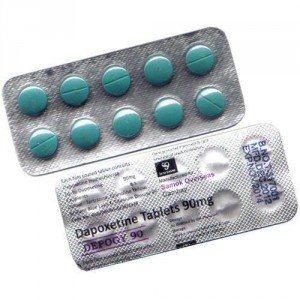The drug is intended for oral administration. Pills should be swallowed whole with at least one full glass of water. Priligy can be taken regardless of meals.
Adult men from 18 to 64 years
Recommended starting dosage for all men is 30 mg; this dose is taken 1 – 3 hours before planned sexual intercourse. In case of insufficient effect and good tolerance, dosage can be increased to 60 mg. Maximal recommended dosage intake frequency – 1 time in 24 hours.
Dosage for premature ejaculation treatment must assess risks and benefits of the drug after the first 4 weeks of treatment or after administration of 6 doses and should determine a risk-benefit ratio to continue taking a drug or not.
[ithshop code=”priligy” tpl=”short” page_id=”1351″ dummy=”txt”]
Patients with impaired renal function
For patients with mild or moderately severe violation of renal function dosage adjustment is not required, but caution is advised. Canadian Priligy is not recommended for patients with severe renal impairment.
Patients with impaired hepatic function
For patients with mild hepatic dysfunction dosage adjustment is not required. This drug is contraindicated in patients with moderately severe and severe hepatic impairment (classes B and C according to Child-Pugh classification).
Patients with low CYP2D6 activity, concomitant use with active CYP2D6 inhibitors
Caution should be taken when increasing dosage up to 60 mg in individuals with low CYP2D6 activity or patients, simultaneously with Priligy (Dapoxetine) taking active CYP2D6 inhibitors.
Patients receiving active or moderately active CYP3A4 inhibitors
Simultaneous treatment with active CYP3A4 inhibitors is contraindicated. At simultaneous Priligy (Dapoxetine) drug reception with moderately active CYP3A4 inhibitors dosage should be reduced to 30 mg.
Overdose
 In clinical tests, cases of overdose are not described.
In clinical tests, cases of overdose are not described.
Priligy dosage up to 240 mg (2 doses of 120 mg every 3 h) caused no unexpected adverse events. Generally, symptoms of SSRI overdose include serotonergic reactions, including drowsiness, gastrointestinal disorders (nausea, vomiting), tachycardia, tremor, excitement and dizziness.
In case of overdose, it is necessary to carry out standard maintenance therapy. Due to significant drug binding to plasma proteins and a large volume of dapoxetine hydrochloride distribution, forced diuresis, dialysis, hemoperfusion and blood transfusion are unlikely to be effective. The specific antidote is not known.
Posted by Dr. Himanshu Singh

 English
English Deutsch
Deutsch Français
Français Italiano
Italiano Español
Español Svenska
Svenska Português
Português 日本人
日本人 Dansk
Dansk Norsk
Norsk Suomi
Suomi Czech
Czech


